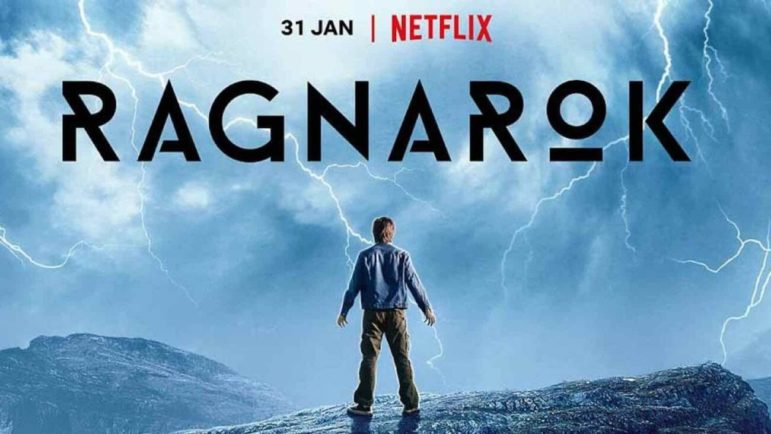
Today’s Arts and Culture offering comes from C. Foxnose Huling, a Norse Animist and apprentice vitki living in New Orleans with an assortment of humans and pets.
The plot of Netflix’s Ragnarok is somewhat familiar: a family returns to its home town, Edda, to discover that things are not what they seem. A teenager (Magne, David Stakston) discovers he is not what he seems – that he is, in fact, a reincarnation of the god Thor. All heck breaks loose, with the only chance of positive resolution resting on the shoulders of a group of teenagers assisted by their “wise elders.”

A promotional image for Netflix’s Ragnarok, showing Magne (David Stakston) on a stormy beach [Netflix]
There are many things to recommend Ragnarok, which is Netflix’s third Norwegian language production. The Danish production company SAM has set the action in a Norwegian town called Edda, which is beset by problems of pollution, industrialization, and climate change. The modern setting is welcome, and the character development of the new incarnations of the gods is largely interesting and apt – though I am hoping Freyja (Danu Sunth) will get a little weightier in season three. (If there is a season three. Please let there be a season three!)
The majority of the series revolves around a jotun family, the Jotuls, and their degradation of the land. Cast here as industrialists and de facto rulers of the small town, there is initially little nuance in the Jutuls’ characterization. I found this disconcerting early on; are we supposed to understand the jotuns as a force of pure destruction? The lore that we have shows this is not the case, and I found this off-putting.
But are not the industrialists of today shaping the environment? Melting our ice, poisoning our land? People in Louisiana’s Saint James Parish would certainly say so – as of this writing, we are seeing the damage from Hurricane Ida render the factories of “Cancer Alley” veritable fountains of unrefined toxic chemicals. What slight protections were in place were knocked away by the storm, leaving the already-poisoned community still more vulnerable.
Not all jotuns, it turns out, are wanting to follow this line. The younger generation is torn, with one, Saxa (Theresa Frostad Eggesbø), wanting to clean up their act, and another, Fjor (Herman Tømmeraas), wanting to drop out altogether. The death grip of the older generation has to be loosed – will it? Therein lies the tension, and Magne’s fight.
I found myself thinking of all this as we prepared for and endured Hurricane Ida here in New Orleans. Building very swiftly to a high Category 4 by the time it hit land, the storm knocked out power, brought floods, and blew lives apart. We got lucky, ourselves; our power was only out until September 3rd, the day before I write this, and our house is still standing. Our water quality, dicey as it usually is, stayed true. The parishes nearby did not fare so well.
I wonder if some towns near me still exist at all, and what the bayous look like now. Our state is not really in its familiar boot shape anymore, and hasn’t been for quite some time. The erosion of our coast is rapid, and the effects include stronger storms with no place to slow down until they hit the more populous areas. Add to this the petrochemical industry – from offshore drilling to pipelines to chemical factories (creating Cancer Alley) – and it’s clear that we are not an ecological paradise.
Ida’s destruction pulling a sneak attack on the mid-Atlantic region shows this is not a local problem – that, maybe, there’s not even any such thing as a local problem any more. The interconnectedness of our ecological decisions has been rendered quite clear.
Thor did not kill all the jotun, and Ragnarok’s growing distinction between the beneficial and utterly destructive giants tracks well with the lore. Sorting out friend from foe is not always so easy, and that complexity is well-wrought through the show’s depiction of relationships between the young jotun and their human/god adversaries/friends.
Our wild card, Loki (Jonas Strand Gravli), is naturally on hand to fix (or break) things. He is deftly deployed in the show, as complex as the rest of the characters, and provides a valuable bridge between the worlds of the jotun and the town. Which way he will go come the day of battle remains up in the air.
The underlying questions posed by the series are: How should we treat the land? Who gets to decide? When do we fight?
There is a point in the show where Magne/Thor gives up his power. He renounces the responsibility it entails, and tries to walk away. I think this is an important thing for us all to look at; our battle is hard, but we are not powerless. We each have abilities that can be turned to defeating the destructive giants and saving this planet. Do we walk away?
Magne realizes he is still a part of the world he tried to walk away from. Will he retake his power? Will we?
The first two seasons of Ragnarok are currently streaming on Netflix.
The Wild Hunt is not responsible for links to external content.
To join a conversation on this post:
Visit our The Wild Hunt subreddit! Point your favorite browser to https://www.reddit.com/r/The_Wild_Hunt_News/, then click “JOIN”. Make sure to click the bell, too, to be notified of new articles posted to our subreddit.